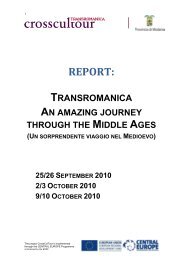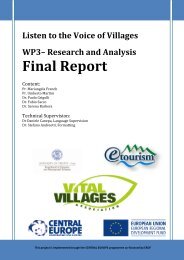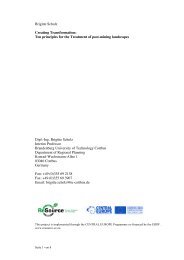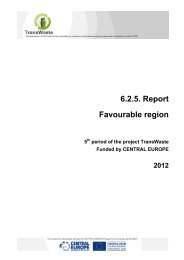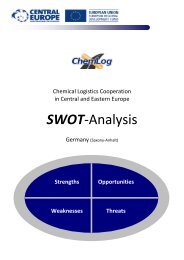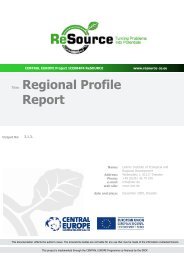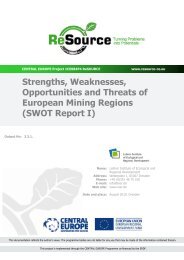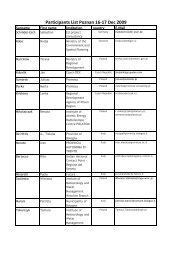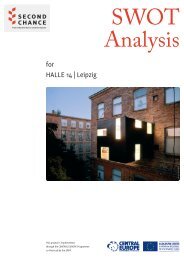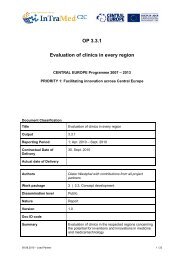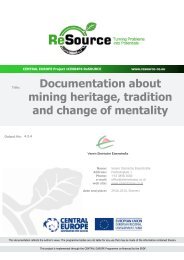Mainly on the Elbe River - Central Europe
Mainly on the Elbe River - Central Europe
Mainly on the Elbe River - Central Europe
You also want an ePaper? Increase the reach of your titles
YUMPU automatically turns print PDFs into web optimized ePapers that Google loves.
3.2 COSTS OF TRANSPORT AND OVERLOAD, SPEED OF TRANSPORT AND<br />
OTHER ECONOMIC ASPECTS<br />
The transport cost is a complex figure c<strong>on</strong>stituted of direct and indirect expenses. These partial<br />
expenses differ according to following variables: transported commodities and <strong>the</strong>ir potential<br />
hazards, equipment of overloading and loading points, requests of recipients, means of transport<br />
and o<strong>the</strong>r parameters. The c<strong>on</strong>diti<strong>on</strong>s for combined transportati<strong>on</strong> are different and so are <strong>the</strong><br />
associated expenses. The expenses are basically divided into direct and indirect costs.<br />
3.2.1 Direct costs<br />
These expenses are c<strong>on</strong>stituted by transportati<strong>on</strong> price, loading expenses of <strong>the</strong> sender,<br />
unloading expenses of <strong>the</strong> recipient and expenses for preparatory overload between individual<br />
transport modes.<br />
• The actual costs of transport were addressed in <strong>the</strong> secti<strong>on</strong> 3.1. The price depends <strong>on</strong><br />
<strong>the</strong> transport mode and <strong>the</strong> commodity type. The transportati<strong>on</strong> prices under ADR, RID<br />
and ADN are generally higher than prices for transporting comm<strong>on</strong> goods.<br />
• The loading costs of <strong>the</strong> sender and <strong>the</strong> unloading costs of <strong>the</strong> recipient are <strong>the</strong> most<br />
variable expenses. The price is different for loose bulk commodities unloaded by<br />
elevators and by dredgers. Pallet goods are not very suitable for closed railway wag<strong>on</strong>s,<br />
but <strong>the</strong>y are ideal for truck transport. The price for transporting depletible commodities is<br />
<strong>the</strong> lowest unless deeply frozen liquid gasses are handled. Generally, <strong>the</strong> loading<br />
costs of <strong>the</strong> sender and <strong>the</strong> unloading costs of <strong>the</strong> recipient for various transport<br />
modes do not significantly differ.<br />
• The expenses associated with overload am<strong>on</strong>g transport modes – obviously, <strong>the</strong>se<br />
expenses are not solely bound to single-mode transport (pure road transport, railway -<br />
shuttle train, waterway – port). Change of a transport mode means an increase in total<br />
transport costs. A double or multiple changes of transport modes (road-railway-road)<br />
deteriorate <strong>the</strong> benefits of a cheaper transport mode.<br />
• Combined transport by ISO c<strong>on</strong>tainers is less burdened with overload costs (easier<br />
handling, identical overloading equipment for all transported commodities).<br />
Fur<strong>the</strong>rmore, <strong>the</strong> necessity to shelter storage areas is eliminated and space<br />
requirements are lower. Also, hazardous materials are in c<strong>on</strong>tainers secured more<br />
easily (c<strong>on</strong>tainers are closed, possibly with safety locks, seals etc.).<br />
Direct costs may involve package price. These costs are ra<strong>the</strong>r not dependent <strong>on</strong> a<br />
transport mode, and <strong>the</strong>refore <strong>the</strong>y are not included by <strong>the</strong> processor.<br />
A feasibility study for “Improvement of C<strong>on</strong>diti<strong>on</strong>s for <strong>the</strong> <strong>River</strong> Transport in <strong>Central</strong> <strong>Europe</strong> (mainly <strong>on</strong> <strong>the</strong> <strong>Elbe</strong><br />
<strong>River</strong>)“ realized within <strong>the</strong> ChemLog project 135



